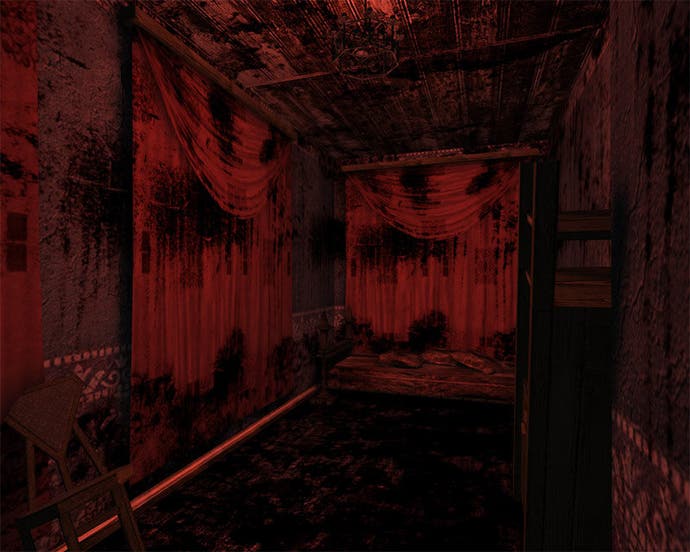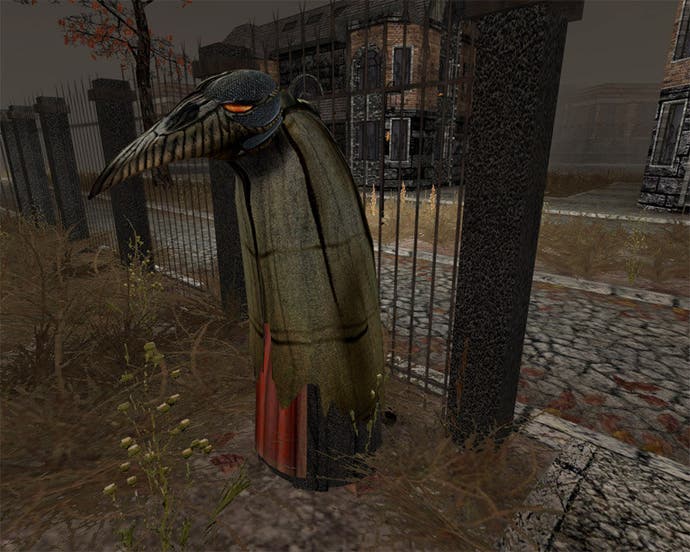Retrospective: Pathologic
Germ theory.
Really, it's all about resource management. For all its first-person perspective and guns and talking, you spend most of your time worrying about your inventory. Near the start of the game, food prices multiply by five overnight. People stock up on weapons, and within a couple of days there are none left. The drugs you need to stay alive are the very same drugs you're bound, as a doctor, to provide to the sick. All the while, you're watching your gauges - your health, immunity, infection level, hunger and fatigue - and establishing what you're going to need more of at a given point. You never, ever have enough of anything.
In all the time since, I don't think I've encountered another game as impressively frightening as Pathologic. It's the purest survival horror. Nothing jumps out at you, and there are no gruesome monsters. This is a game all about death. And death is scary - particularly when it's likely to be your own.
It's always on your mind. You can't escape it - and the minute you try to, the minute you let your guard down, everything turns sour. You'll idly wander into a building to find it littered with cadavers, plumes of mist floating around the room, the walls blistered and oozing puss. Or you'll turn a corner to find yourself face-to-face with the Executor, the bird-masked avatar of doom. When you see the Executor, it's bad news. He's the first sign you've broken the rules, or that someone important is fading.
It's brilliantly cohesive. This is a game about an unstoppable disease, but you don't fight it with guns or tanks, or by solving incongruent puzzles. You fight it with drugs and medical insight. Or, at least, you try. That's a whole different facet of the narrative entirely. For all intents and purposes, it's the horror of something eminently real, and the utterly tangible struggle to survive it by any logical means possible, as the world around you becomes more and more nightmarish.

Even so, it's actually very traditional. People assume it throws away all of the standard methods of play, but it does nothing of the sort; it just includes more of them, and shuffles their priorities. You've a gun poking out of the bottom of the screen, but you can complete the game firing it maybe three times. But it's still there, still an integral part of the experience. It feels like an RPG, only without any character development. Except there's loads of character development; it's just presented as your mastering of the town's collapsing economy, and your funding of various items to balance your health, immunity and so on. The adventure game puzzles warp into the necessity to plan five or six steps ahead at every stage. And it's all hidden beneath what you spend most of your time in Pathologic doing: walking endlessly back and forth, between characters who may or may not be able to help you on your quest.
Really, the only thing different about Pathologic is that it takes its time getting to the point. But it does get there, and the mundanity of your journey is as significant as anything else. You pass children in the street, orphaned and homeless, who gaze at you hopefully. You'll spot a gang of thugs in the distance, chasing after and eventually beating a helpless woman. You witness these things because you had to take the scenic route, all the way around the infected centre of the town, because if you didn't you'd have died. It's often a bit of a slog, but it's completely essential in driving home this bleak situation. It's inconvenient. Of course it's inconvenient. It's an ungodly plague, hell-bent on destroying everything in its wake. And you have to deal with it.

You also have to deal with how depressingly broken it is. Game-stopping bugs, clunky combat, butchered translation and a hideously ugly engine all hold Pathologic back. Initially released in 2005, it looked at least half a decade out of date, and though the script was often wonderful, it just as frequently fell into nonsensical gibberish and grotesque grammatical error. It was a beautiful game - but only on the inside.
Funnily enough, though, it hasn't aged that badly in the time since. Pathologic doesn't rely on its presentation, so it's not too problematic. The translation is poor, certainly, but it still makes some sort of weird sense, and is often hauntingly poetic. And the snail-like pacing is something we're growing more accustomed to again, particularly in the more artsy games. By way of awkward comparison, The Path - Tale of Tales' recent bizarre offering - makes Pathologic feel like Doom II.
It's unlikely we'll ever see anything like it again. And that's a shame. It's not the complete package, but there's so much promise and wisdom seeping from the many collapsed, decaying structures of the game. And it's really, really worth a try, even now. Even though you won't enjoy it. Even though it'll destroy you, which it will. But you'll be a better person for having lived through it.
Good luck finding Pathologic in the shops, but you can hunt it down online if you fancy a go, as it's on download services like Direct2Drive.
